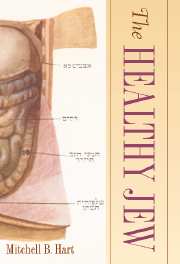Book contents
- Frontmatter
- Contents
- Preface and Acknowledgments
- THE HEALTHY JEW
- Introduction: “Links in a Long Chain”: Jews, Judaism, Health, and Hygiene
- 1 “'Tis a Little People, But It Has Done Great Things”: The Role of Health and Medicine in Modern Jewish Apologetics
- 2 Moses the Microbiologist: Alfred Nossig's The Social Hygiene of the Jews
- 3 Healthy Hebrews, Healthy Jews: The Bible as a Sanitary Code in Anglo-American Medical Literature
- 4 From Ghetto to Jungle: Darwinism, Eugenics, and the Reinterpretation of Jewish History
- 5 TB or Not TB, That Was a Jewish Question: Moses, Kashrut, and the Prevention of Tuberculosis
- 6 “Then What Advantage Does the Jew Have?”: Judaism as a Model for Christian Health
- 7 Conclusion
- Notes
- Bibliography
- Index
2 - Moses the Microbiologist: Alfred Nossig's The Social Hygiene of the Jews
Published online by Cambridge University Press: 18 July 2009
- Frontmatter
- Contents
- Preface and Acknowledgments
- THE HEALTHY JEW
- Introduction: “Links in a Long Chain”: Jews, Judaism, Health, and Hygiene
- 1 “'Tis a Little People, But It Has Done Great Things”: The Role of Health and Medicine in Modern Jewish Apologetics
- 2 Moses the Microbiologist: Alfred Nossig's The Social Hygiene of the Jews
- 3 Healthy Hebrews, Healthy Jews: The Bible as a Sanitary Code in Anglo-American Medical Literature
- 4 From Ghetto to Jungle: Darwinism, Eugenics, and the Reinterpretation of Jewish History
- 5 TB or Not TB, That Was a Jewish Question: Moses, Kashrut, and the Prevention of Tuberculosis
- 6 “Then What Advantage Does the Jew Have?”: Judaism as a Model for Christian Health
- 7 Conclusion
- Notes
- Bibliography
- Index
Summary
In 1894 Alfred Nossig, a 30-year-old Polish Jewish writer, artist, and social scientist, published a history of “the social hygiene of the Jews and ancient Oriental nations” (Die Sozialhygiene der Juden und des altorientalischen Volkerkreises). Born in 1864 in Lvov (Lemberg), Nossig studied natural sciences, medicine, law, and philosophy at the universities of Lemberg and Czernowitz, and received a doctorate in law from the University of Czernowitz in 1888. He moved to Vienna in 1892, and then to Paris, where he completed the research and writing of his book on social hygiene. Nossig wanted to contribute, as he told his readers, to the current debate in European parliaments and in the press over questions of public health and policy. Through descriptive analyses of the ancient law codes of China, India, Persia, Egypt, and predominately Israel, Nossig sought to show how these systems had resulted in the five nations' superior biological and moral qualities and how they might, in turn, serve as models for contemporary states and societies. According to Nossig, these law codes were not religious in nature; rather, they were rules of hygiene intended to maintain and advance the health of the individual, family, nation, and race.
Nossig, like others discussed in this book, took advantage of the decline of the long-standing idea that Egypt was the origin of philosophy and science even as he sought to challenge the notion that the Greeks deserved this honor.
- Type
- Chapter
- Information
- The Healthy JewThe Symbiosis of Judaism and Modern Medicine, pp. 54 - 77Publisher: Cambridge University PressPrint publication year: 2007



